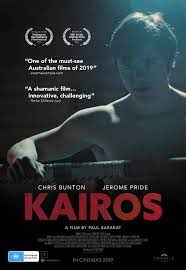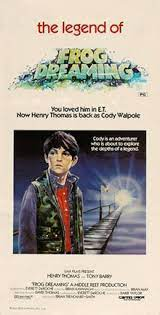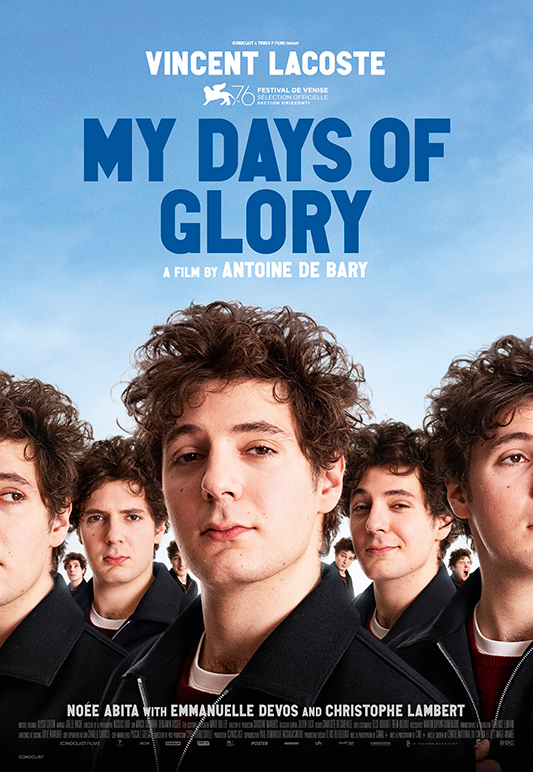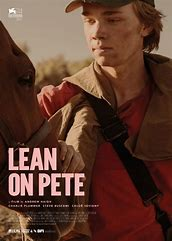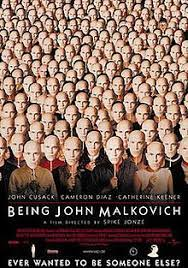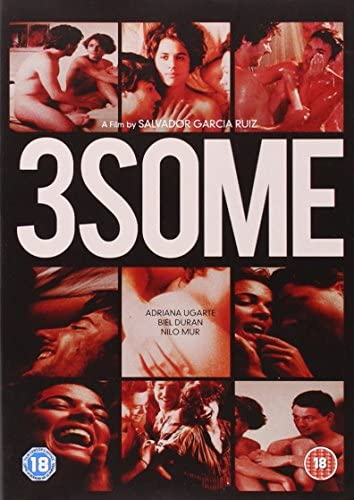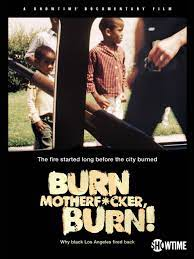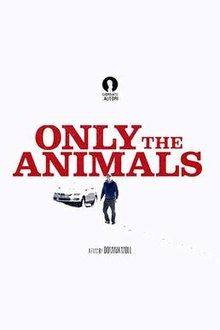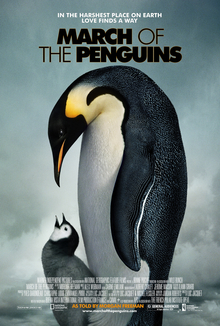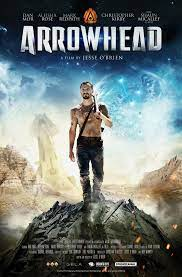With how frankly excessively PC so many of us have become now, I doubt The Ringer would've been made today but as somebody on the autism spectrum, I genuinely found it hilarious and sincerely sweet and here's why. Screenwriter Ricky Blitt and director Barry W. Blaustein clearly have no desire to attack any of the disabled characters here; instead their target is the so-called "hero" Steve, for quite passively complying with such an unethical and fraudulent scheme, and his disabled roommates are the only ones anyway who his act doesn't fool. It also subtly condemns the Special Olympics for how it can really exploit its athletes instead of promoting and celebrating them and for how easily the system can (at least apparently) be rorted.
Thursday, 29 December 2022
Something Cult, Foreign-Language or Indie #316: The Ringer (2005).
With how frankly excessively PC so many of us have become now, I doubt The Ringer would've been made today but as somebody on the autism spectrum, I genuinely found it hilarious and sincerely sweet and here's why. Screenwriter Ricky Blitt and director Barry W. Blaustein clearly have no desire to attack any of the disabled characters here; instead their target is the so-called "hero" Steve, for quite passively complying with such an unethical and fraudulent scheme, and his disabled roommates are the only ones anyway who his act doesn't fool. It also subtly condemns the Special Olympics for how it can really exploit its athletes instead of promoting and celebrating them and for how easily the system can (at least apparently) be rorted.
Friday, 9 December 2022
Something Cult, Foreign-Language or Indie #315: Anna and the Apocalypse (2017).
The songs are catchy and engaging, the cast all demonstrate strong chops with both acting and singing, and the violence gradually builds to a very gruesome climax. It's maybe not as brutally honest or subversive a depiction of adolescence as I would've liked it to have been but regardless, I had fun with Anna and the Apocalypse. 8/10.
Thursday, 1 December 2022
Something, Cult, Foreign-Language or Indie #314: Kairos (2018).
Tuesday, 15 November 2022
A shopping incident on Monday.
So I'm in Coles on Monday, standing near one of the stalls in the bakery, and unbeknownst to me, another customer (who I didn't even hear or see) notices me put something in one of my pockets and that alerts their suspicion. Then about five minutes later I've moved on to one of the aisles and the manager suddenly appears. I think he's just there to ask me if I need help finding something but I get a completely different line of questioning, about what's in my pockets. I tell him "Just my phone, wallet and car and house keys." That's when I learn this other customer reported me to him. He quickly seems to believe that I hadn't even tried to steal anything (the item I was seen putting in my pocket was my phone, after I'd pulled it out to check it) and to sense just how anxious I am now and so he apologises to me and lets me go, which I thank him for with great sincerity and relief. I then stay in the store for about ten minutes before I quietly leave.
Firstly, I should emphasise I was not, and am not, angry at all with the manager (who presumably had a lot on his plate already); he was just doing his job. Nor am I saying the customer was wrong to consult him about this. I just really resented them not first approaching me personally about it, and here's why. I can understand they might've been afraid of the consequences or overstepping their place as they had no authority there, but when I'm confronted secondhand about something, it makes me feel like I'm some unapproachable psycho. Had I been the witness, I would've slowly approached them and enquired, as impartially as possible, what they'd just put in my pocket, then apologised for prying and, whatever their answer was, then told an employee about it.
I'm really trying to empathise with them but I just can't quite shake how judged and exposed I subsequently felt; I was also angry and very confused. Now, I don't know if the other customer was suspicious of my actions because I'm 6'4 and autistic (because my condition can also affect my body language and posture), although if that was the case I guess I can and should give them the benefit of the doubt. And perhaps I should've been more careful with my phone. But despite being exonerated and very much appreciating that outcome, this incident made a supermarket visit unusually troubling for me.
Friday, 11 November 2022
Something Cult, Foreign-Language or Indie #313: Frog Dreaming (1986).
Henry Thomas (yes, the one who befriended E.T.) is Cody, an orphaned American boy living in the Australian Outback with his carer Gaza (Tony Barry). When he's not riding his railbike left, right and centre, the inventive Cody builds things in his garage. One day he learns of a local Aboriginal myth called "frog's dreaming" which is believed to be behind several strange occurrences at the fictional Devil's Knob national park where he lives. That's when Cody recruits his friends, primarily the girl he fancies, Wendy (Rachel Friend) to go on a trek to investigate everything.
Yes, sir. It's The Goonies but in the Outback with a (mostly) local cast. Everything about Frog Dreaming is painfully dated and stagnant even down to the visual effects. Director Brian Trenchard-Smith, who replaced Russell Hagg, brings no zest or humour to his interpretation of Everett De Roche's shamelessly derivative screenplay (although, in fairness, it may have given Trenchard-Smith no room to do so), which tops its genre conventions off with a portrayal of the indigenous Kurdaitcha Man archetype that thankfully would never be considered appropriate today, and has Cody frequently riding his bicycle just like Elliott much more famously did.
Thomas has virtually nothing new to do in a very thin role, Friend is wasted and almost immediately relegated to the token love interest status, and all the adult cast members look totally bored and indifferent (much like I increasingly was while watching it, funnily enough). And then come the deeply hokey effects when we learn what's behind the local disturbances. It's ironic, and unintentionally apt, how Frog Dreaming contains the word "dreaming" in its title, because it almost put in the state of dreaming. 4/10.
Tuesday, 11 October 2022
Something Cult, Foreign-Language or Indie #312: My Days of Glory (2019).
Additionally, the dramatic elements become, I think, too heavy-handed and overall, as both a romance and a coming-of-age flick, I just don't think it has enough zest and imagination narratively, and certainly not aesthetically. My Days of Glory do not, for me, mark de Bary's. 5/10.
Friday, 7 October 2022
My feelings on the Thailand massacre.
On Thursday when I heard news of the childcare centre massacre in Thailand, my heart instantly sank. I had a foreboding, ominous feeling as it was revealed in a breaking news story during the 7pm nightly bulletin I watch. For that reason I deliberately also watched that night's late news just for more details on it. I was sincerely gut-wrenched as those extra details were revealed to me. A massacre in a place for children is usually tragic enough, but here the perpetrator was also the father of one of the children who went there regularly. Then, after the encounter there that lit his fuse and the carnage that ensued, he went home and murdered his own wife and child. I mean, Jesus fucking Christ! How damaged must you be to even consider doing something that wicked?
His name was Panya Khamrab, and he was a disgraced former cop. Keyword: "disgraced." Shouldn't that have sounded alarm bells about him, suggesting he needed to be monitored somehow, or better yet, incarcerated? Had he indeed been behind bars, this massacre wouldn't have happened and a class of innocent children and their teachers would still be alive and none of their families would be grieving. My heart goes out to those families, and may the deceased all rest in peace. These massacres are clearly far from just an American problem; recently we saw that in Russia and now, sadly, it's been Thailand's turn. I don't know which country, or community, will be next, but I hope - against hope - none will.
Something Cult, Foreign-Language or Indie #311: Shorts (2009).
Rodriguez also coaxes engaging performances from all his young cast and the adults all also enjoy themselves, particularly Leslie Mann as Toby's mum and James Spader as the villainous Mr. Carbon Black. I did think the novelty began to wear off near the end, but Shorts doesn't overstay its welcome. It's a refreshing, funny and bizarre family science fiction flick like only Robert Rodriguez could, or would, deliver. 8/10.
Tuesday, 20 September 2022
Something Cult, Foreign-Language or Indie #310: Inside Job (2010).
Against all odds, Charles Ferguson's 2010 Best Documentary Feature Academy Award winner Inside Job proves that flawlessly. But how it does that trick is perhaps even more surprising and significant than that it does the trick: it explores the GFC and the fiscal lead-up to it in five segments, beginning with the aftermath of the Great Depression through to the late 1980s recession following Black Monday and how so many major American banks and investment firms gradually acquired too much unregulated power. They were at least as much at fault as the politicians who turned a blind eye to that corruption and their own, and when these banks and firms began fraudulently charging their customers and investors, the subprime mortgage bubble was bound to burst and the GFC was inevitable when, as the film demonstrates, it could've been avoided so easily. The true root of the crisis was the crimes on Wall Street, not of the White House (although the Bush Administration's bail-out efforts tanked infamously), and how those crimes either were covered up and/or went unpunished.
Friday, 16 September 2022
Something Cult, Foreign-Language or Indie #309: Electrick Children (2013).
This 2013 debut from writer-director Rebecca Thomas, who herself was raised Mormon, initially shows promising signs of subversion and originality, but then increasingly indulges in tameness and a flurry of coming-of-age narrative cliches. Rachel and Mr. Will's Vegas adventures see them (involuntarily, in Mr. Will's case) explore sex and substance abuse, but themes like that don't alone make a movie daring IMO and especially not when they're depicted in such a tactful but soft-core manner. There's also very little humour here to spice it up and not enough of a contemporary music soundtrack to add energy to it. Garner gives a beautifully dignified and balance performance as Rachel and Aiken adequately makes Mr. Will the grounding, centrifugal force to her closet wild child, but Culkin really doesn't have much to do as the token unrefined love interest.
Something Cult, Foreign-Language or Indie #308: The Machinist (2004).
Overall, this Machinist is very played, but I think his machine needed cogs of an entirely different kind. 6/10.
Thursday, 1 September 2022
Something Cult, Foreign-Language or Indie #307: Lean on Pete (2017).
Friday, 19 August 2022
My weekend's off to a VERY stressful start.
So yesterday afternoon I took the bus to my parents' house 30 minutes out of town, to pet-sit for them while they're having this weekend away. But then when I arrive there, I found the usually unlocked back screen door locked and I had no key; I didn't take one with me because again, that door is usually left open for me to enter the house when necessary. I opened the lock there containing spare keys, only to find neither of those were for neither screen door. I then tried calling my parents but they had no reception and by now I was already stressed, so I had to swallow my pride and call my sister, who lives a few minutes away. When she arrived and I explained everything (all of which she took with a grain of salt, as she continued to do later), she then had to drive me home and back again just so I could retrieve my other set of keys, which turned out (to my genuine confusion) to also be the wrong ones; I also tripped over on the lawn once we returned to my parents' house because I hadn't realised one of my shoelaces was undone. So then we both had no alternative, as it was now past 6pm, but to go to her house for the night, where I had dinner, watched my team the Broncos lose by 48 points and sleep on a foldout bed (although that was easily preferable to the floor). I had an anxiety attack before I finally nodded off.
Then today I woke at 6:30am, and after 8am we all went (including my brother-in-law now) back to my parents' place to double-check the lock and the keys inside it per my sister's insistence. After she and he saw those really were also the wrong keys I tried not to be too snide or snarky when I said, "See, I told you they didn't work." They both then left, with my approval, and I stayed there to at least pet-sit like I was in town all along to do, albeit for much shorter than planned, and I helped myself to a beer there because I figured, 'Damn it, I deserve one after a shake-up like this.' I then planned to catch the bus home at 11:12am but as I left the service station toilet (just across the road from the bus stop) at that minute, the bus was departing so I stayed put and tried to hail the driver when they turned around and passed me, to no avail. By then I was fucking livid, so after seeing when the next bus was and learning it was over three hours away, I tried to think for a few minutes and then realised I had to call a taxi. So I did that, and once it arrived the ride was fine and the driver was a lovely lady who played great music and undoubtedly was about to get a big windfall from my 30-minute trip. Her company was a big bright spot, but everything culminating in it was confusing, guilt-inducing, embarrassing and incredibly stressful for me. Now I'm back home, but as soon as I got here, I hunched over with relief and almost cried. Hopefully, this weekend will improve for me.
Tuesday, 2 August 2022
Something Cult, Foreign-Language or Indie #306: Sword of the Stranger (2007).
Something Cult, Foreign-Language or Indie #305: The Lighthouse (2019).
Friday, 15 July 2022
Something Cult, Foreign-Language or Indie #304: Being John Malkovich (1999).
Thursday, 14 July 2022
Something Cult, Foreign-Language or Indie #303: My Mistress (2014).
Look, admittedly what grabbed my attention about this 2014 Aussie erotic drama was the sexual content but even with that, I found My Mistress increasingly insipid and even tame. I can only liken it to a piece of chewing gum: initially it's absolutely delicious, but from a lack of variety its flavour runs out after about 20 minutes. The BDSM scenes are discreetly handled but I just got the sense director and co-writer Stephen Lance either deliberately or was forced to water them down to avoid the movie getting an R rating, and the rest of the narrative they're in I found seriously dull and hackneyed. The lack of a music soundtrack compounded this, and there's no sense of romanticism or lushness in the cinematography either.
Beart, one of the icons of modern French cinema, seems to enjoy spicing her screen image up here as a publicly conservative yet privately wild housewife, and Gilbertson keeps the sweet innocence to a pleasant minimum, but their efforts only make somewhat of a difference. For me, My Mistress is an underwhelming and timid telling of a narrative that could've been tactful, daring and brilliant. 6/10.
Thursday, 7 July 2022
Something Cult, Foreign-Language or Indie #302: 12 Monkeys (1995).
Saturday, 2 July 2022
Something Cult, Foreign-Language or Indie #301: 3some (2009).
Wednesday, 29 June 2022
Something Cult, Foreign-Language or Indie #300: Happy as Lazzaro (2018).
Wednesday, 22 June 2022
Something Cult, Foreign-Language or Indie #299: The King of Comedy (1982).
Thursday, 9 June 2022
Where I was for all of May.
Hello again, to anybody out there who actually follows this blog. (Just for clarity I doubt anybody does, but if you actually do, thank you.) "So, Jarred, where have you been?" I hear you ask. Well, I set myself a challenge. I chose to re-watch all 33 of my #1 movies from every year of my lifetime so far, and to maintain continuity, I resisted watching any other movies in that time. That was why, until yesterday, I posted no new reviews here (or anywhere else, for that matter). Naturally, I'd seen most of the older movies in that group far more times than most of the newer ones, and due to several factors unrelated to the films themselves, I actually nodded off during a few of them and then had to resume them later from roughly where I'd fallen asleep (one of them, believe it or not, which I fell asleep during was Star Wars: The Force Awakens). That left me frustrated with myself.
It was also a good challenge in that, while I always knew beforehand what I'd be watching the next day, on certain days I had to alter my routine to fit them in, and somebody like me can become too dependent on routine. Most particularly, on the day when I was set to watch The Wolf of Wall Street, a three-hour film, I had social activities on that morning and then had to wait until after 4pm, when the female cleaner who cleans my unit, had finished her shift because I really didn't want to risk making her uncomfortable by watching a movie in which Leonardo DiCaprio snorts drugs off a naked woman's body (among other immoral acts) in her presence. Then I had to cook dinner at 7pm, the time when I usually eat it.
Anyhow, I completed that self-imposed challenge and I don't regret undertaking it. That's, however, the only unusual thing that's happened to me lately and nothing really negative has occurred recently. I've also maintained writing poetry and, come to think of it, I've found a new special outdoor place locally where I've already returned a couple of times; last time I actually composed a new poem there. So overall, recently my life has been as varied as it's been stable.
Something Cult, Foreign-Language or Indie #298: Wheels on Meals (1984).
I'm a huge Chan fan and so upon learning this one starred him it provoked my interest, but I don't think it's a bright spot of his back catalogue. The fight scenes are, of course and as always, impeccable and several moments amused me, but both of those pluses are woven into what I considered a really dull and inhibited narrative. Hung (who later directed Jackie again in the far superior Mr. Nice Guy in 1997), and writers Johnny Le and Edward Tang offer a vision that's half urban crime caper, half swashbuckling adventure but both of those approaches here felt hackneyed and they never quite meshed together cohesively. For clarity I realise the narrative isn't the chief point of a martial arts movie but still, that can be very hard to ignore and here I couldn't quite because it didn't exactly charm me.
Saturday, 30 April 2022
Something Cult, Foreign-Language or Indie #297: Burn, Motherfucker, Burn! (2017)
Something Cult, Foreign-Language or Indie #296: Biography: I Want My MTV (2019).
Saturday, 16 April 2022
Something Cult, Foreign-Language or Indie #295: The Mafia Kills Only in Summer (2013).
This Italian critical darling began really so well for me, with its unusual but genuinely charming mix of The Wonder Years, Amelie, Goodfellas and Good Bye, Lenin!. The first half with child Arturo mixes the respective nostalgia and narration, romantic whimsy, mafia theme and political subtext of those four classics. But then it jumps forward to adult Arturu now working as a journalist and still in love with Flora, and I can understand and appreciate how that creative choice was taken for a narrative arc and variety but that's where the film's consistency really dropped for me. The childhood scenes are sweeter than a gelato (and you know I've made that reference because this is an Italian movie) and the adulthood ones, in fairness, abandon that for realism to show the contrasts between those life stages, but I just found the transition quite jarring and the outcome increasingly bland. I think Dilberto should've added some subtle visual or thematic connections in the latter scenes to the events in Arturo's and Flora's childhoods. Not to mention more emphasis in the cinematography, particularly, on the Mediterranean landscape nearby, and in a few scenes Roberto Forza's score I found rather intrusive.
Friday, 15 April 2022
Something Cult, Foreign-Language or Indie #294: Hotel Artemis (2019).
Wednesday, 13 April 2022
Something Cult, Foreign-Language or Indie #293: Only the Animals (2019).
One or two scenes may be just slightly too long, but Only the Animals nonetheless is a refreshing departure for European thrillers. 8/10.
Sunday, 10 April 2022
Something Cult, Foreign-Language or Indie #292: Weathering with You (2019).
If you read this and you're about to watch the movie, that's my forecast for what you'll get with Weathering with You. 6/10.
Friday, 8 April 2022
Something Cult, Foreign-Language or Indie #291: The Emperor's Club (2002).
Based on Ethan Canin's 1994 short story The Palace Thief, The Emperor's Club is harmless but unremarkable. That's because despite Kline's solid lead performance and the presence of a few newbies who've since gone on to A-list Hollywood status (there's also a young Jesse Eisenberg here), this narrative makes absolutely no effort to explore ignored avenues or to bravely throw the big emotional punches. Both of those intentions are very risky, as both can make the book/film etc. seem like it's trying too hard to be respectively unconventional or powerful. (What makes all the difference is how the director treads the chosen territory.) But trying to take either of those routes and falling into the respective traps is, I think, preferable in some ways than shying away from said routes altogether. Instead, director Michael Hoffman and screenwriter Neil Tolkin take a quite stuffy approach to this school-based coming of age flick and while I had feeling at the start that this would be emotional overkill and it turns out I was wrong there, I still wasn't engaged, moved or inspired.
Friday, 1 April 2022
On THAT slap.
Everybody saw it. Literally the entire world; the amount with TV or internet access anyhow. What the hell was Will Smith thinking - if he was thinking at all? You were at the Academy Awards, dude! The world's highest-profile awards show! Plus, you were about to mark a career peak with the Best Actor Oscar!
I don't know. But I do know what happened around me when I saw it. I was watching the show with a friend and, in the moment, I thought Will's intentions, at least, were understandable, but my friend was outraged. Personally, I still don't think he should've gone up there and hit Chris Rock, but I do think doing that was just foolish, and it has overshadowed the achievements of the other winners, namely the queer and Latino Ariana DeBose and the deaf Troy Kotsur. I also knew when it happened that it would be an instant media - news and social - whipping horse, and there I was right. Plus, what was keeping Smith from saving those feelings for his acceptance speech since he must've known he was his category's warm favourite?
Furthermore, he was laughing himself at Rock's joke that sparked it all, until he saw wife Jada's upset reaction. That was evidently what tipped the scales, but it didn't make his initial reaction any less hypocritical and then in his speech itself, he advocated for peace and harmony. Rock's joke also was sexist and body-shaming, but it was just a joke and it was meant to provoke, so by lashing out like he did, Smith gave Rock that very satisfaction. I also think somebody seated near Smith should've tried to restrain or calm him before he walked on stage; they must've known, from his yelling, how angry he was.
In fairness, Smith did apologise during his speech and, at greater length, in a statement after the show. But now, after the Academy announced an investigation into this incident and possible disciplinary action against him (including stripping him of his Oscar), he has resigned from their membership. I call that cowardly jumping before you can be pushed. I'm still prepared to give him a second chance; too many celebrities have been punished more for equal or greater sins. But Will would be very wise to avoid a repeat of this entire very public scandal.
Saturday, 19 March 2022
Something Cult, Foreign-Language or Indie #290: Checkered Ninja (2018).
Something Cult, Foreign-Language or Indie #289: March of the Penguins (2005).
March of the Penguins is less emotional and polemical, and far less aggressive than Blackfish (2013), and again it's very slow, but if you have the patience for it, like I did, you should find it to be a very illuminating, subtly sweet, impartially political, educational, slow-burning beauty. Oh, and did I mention it won the 2005 Best Documentary Feature Oscar, and that Jacquet and his co-producer Yves Darondeau brought plush penguins to the Academy Awards with them?
Thursday, 10 March 2022
Something Cult, Foreign-Language or Indie #288: Arrowhead (2015).
Kye Cortland (Dan Mor) is a political prisoner trying to escape a mining colony. A rebellion recruits him one day to rescue his father from a totalitarian government and he acquiesces, but during his mission he accidentally crash-lands on a desert moon of strategic value to both warring sides. Now he must survive and find a way off the moon, with the "help" of his ship's AI, Re3f (Shaun Micallef, giving a surprisingly effective dramatic vocal performance).
This 2015 Aussie science fiction flick, which writer-director Jesse O'Brien made for just $150 000, is like The Martian meets Mad Max meets WALL-E. But it's actually based on a film school short O'Brien made in 2012 for just $600. The result is a rather suspenseless but nonetheless intriguing and confident outer-space survival movie, and certainly one in the hard science fiction tradition (think writers like Isaac Asimov and Arthur C. Clarke, whose works were notably more factually scientific than other SF writers). Indeed it's very low on action but that's the point, as our hero is a mostly lone figure in his environment anyway, and Mor plays him with just the right blend of grit, vulnerability and composed loneliness.
Samuel Baulch's photography is calmly paced and focused, his and O'Brien's editing is never flashy or too subtle, and Ryan Stevens compliments it all with a suitably earthy and ominous score. For me, Arrowhead shoots and hits its target. 8/10.
Friday, 4 March 2022
How I'm feeling now about the aforementioned incident a fortnight ago.
So it's now been a fortnight since I ran into my ex-friend who I fell out with badly after I gave her email address out without her permission. I spent about the next five days dwelling on that, but while it's still on my mind to a degree, the dwelling has ceased since last week. I'm still remorseful about it, I promise you, but not to the point of beating myself up about it. At some point, I think you need to stop doing that. Remember your errors and flaws, without letting them continually make you feel bad about yourself.
Yesterday, I had another session with one of my therapists with whom I discussed the matter (I named no names, just for the record). After painting the picture and expressing all my feelings on it, she told me, frankly but gently, I'd been conned but that I was nonetheless largely responsible. She concluded that there was probably no way of resolving this conflict, at least for now, and that I'd therefore just have to live with it.
I do believe that's correct. Either way, many of the feelings I had when I composed my previous post about the incident are ones I haven't shaken, although I am consciously trying my hardest to uphold a balanced perspective about the entire fiasco, both for clarity and more importantly out of respect for the other two parties. And my anxiety and shock about it has eased now.
Another lingering thought I have about (and which I'm adding to this post almost two months later) is that the falling out had three contributing factors and sources. I shouldn't have given the email address out, my friend who wanted it should've told me really what for, and had my ex-friend simply given my friend (even if only to shut her up) a chance to host some trivia nights like she knew my friend had wanted to do for some time, then my friend probably would've left her alone.
Friday, 25 February 2022
Something Cult, Foreign-Language or Indie #287: 99 Homes (2014).
99 Homes was a darling of numerous film festivals in 2014 and even generated Oscar buzz, but I don't understand how. Going into it I was expecting a slow-paced drama and that's primarily what it is, which is fine, but I just the found the actual narrative, and the pacing, to be increasingly and highly monotonous. Director and co-writer Ramin Bahrani's approach here is, I think, very plodding and self-conscious where a little more assertiveness and immediacy wouldn't have hurt. It simply never grabbed me, thematically or artistically, and I was in my early 20s (roughly Dennis' age) during the GFC so I recall it well. I also think the visual approach was rather too glossy and refined for a crime drama set in suburbia.
Garfield does what he can with a somewhat stock young adult protagonist and Shannon never makes his villain too cartoonish, but the best performance is from Dern, who infuses Lynn with dignity and strength. The lack of a non-original soundtrack is a fresh touch that helps to not date the movie's focus, but I'm afraid for me those pros were in too short a supply to help it overcome the rest of the stylistic and storytelling approach applied to it. Were I at an auction for these 99 Homes, I wouldn't be among the highest bidders. 5/10.


